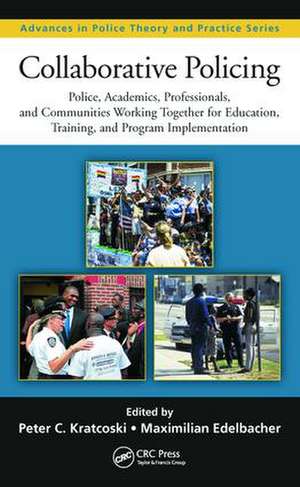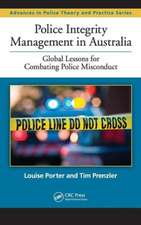Collaborative Policing: Police, Academics, Professionals, and Communities Working Together for Education, Training, and Program Implementation: Advances in Police Theory and Practice
Editat de Peter C. Kratcoski, Maximilian Edelbacheren Limba Engleză Hardback – 5 oct 2015
—Dilip K. Das, PhD, Founding President, International Police Executive Symposium (IPES) and founding editor-in-chief, Police Practice and Research: An International Journal, from the series editor’s preface
"The chapters in this book present genuinely comparative, theoretically informed, and experience-based collaborative programs to appraise and analyze the specific practical, theoretical, and psychological challenges of working together and the creative means to overcome those challenges."
—Otwin Marenin, Department of Criminal Justice and Criminology, Washington State University, from the foreword
A collection of chapters authored by internationally known police leaders, academics, researchers, and professionals, Collaborative Policing focuses on the fact that the worlds of policing practice and research are moving closer. Using in-depth interviews with police and professionals who work with justice agencies as well as case studies demonstrating fruitful police–academic collaboration, it explores methods and programs for improving the quality of services provided by the police.
Many police executives, in conjunction with citizens and political leaders, now define the missions of their agencies on the basis of research findings, practical experience, and projections of what policing will involve in the future. This book shows you not only that collaboration can occur, but that it can also enhance police service, which in turn improves the quality of life for the communities they serve. Its descriptions of police–academic cooperation provide you with valuable guidelines for designing programs to develop a better police force and a stronger community.
| Toate formatele și edițiile | Preț | Express |
|---|---|---|
| Paperback (1) | 436.14 lei 6-8 săpt. | |
| Taylor & Francis – 10 dec 2019 | 436.14 lei 6-8 săpt. | |
| Hardback (1) | 707.86 lei 6-8 săpt. | |
| Taylor & Francis – 5 oct 2015 | 707.86 lei 6-8 săpt. |
Din seria Advances in Police Theory and Practice
- 8%
 Preț: 440.67 lei
Preț: 440.67 lei -
 Preț: 326.25 lei
Preț: 326.25 lei -
 Preț: 357.55 lei
Preț: 357.55 lei -
 Preț: 340.84 lei
Preț: 340.84 lei -
 Preț: 282.67 lei
Preț: 282.67 lei -
 Preț: 370.70 lei
Preț: 370.70 lei -
 Preț: 389.66 lei
Preț: 389.66 lei -
 Preț: 436.14 lei
Preț: 436.14 lei -
 Preț: 437.50 lei
Preț: 437.50 lei - 15%
 Preț: 454.68 lei
Preț: 454.68 lei -
 Preț: 448.44 lei
Preț: 448.44 lei -
 Preț: 431.18 lei
Preț: 431.18 lei -
 Preț: 359.30 lei
Preț: 359.30 lei - 20%
 Preț: 373.53 lei
Preț: 373.53 lei -
 Preț: 436.14 lei
Preț: 436.14 lei -
 Preț: 431.53 lei
Preț: 431.53 lei -
 Preț: 436.14 lei
Preț: 436.14 lei -
 Preț: 430.96 lei
Preț: 430.96 lei - 15%
 Preț: 463.02 lei
Preț: 463.02 lei - 5%
 Preț: 1095.75 lei
Preț: 1095.75 lei -
 Preț: 435.00 lei
Preț: 435.00 lei - 5%
 Preț: 417.45 lei
Preț: 417.45 lei -
 Preț: 452.53 lei
Preț: 452.53 lei -
 Preț: 436.14 lei
Preț: 436.14 lei - 25%
 Preț: 425.32 lei
Preț: 425.32 lei -
 Preț: 427.12 lei
Preț: 427.12 lei - 14%
 Preț: 312.43 lei
Preț: 312.43 lei -
 Preț: 436.14 lei
Preț: 436.14 lei -
 Preț: 436.14 lei
Preț: 436.14 lei - 14%
 Preț: 312.43 lei
Preț: 312.43 lei -
 Preț: 433.09 lei
Preț: 433.09 lei -
 Preț: 504.99 lei
Preț: 504.99 lei -
 Preț: 439.80 lei
Preț: 439.80 lei -
 Preț: 436.14 lei
Preț: 436.14 lei - 18%
 Preț: 1016.06 lei
Preț: 1016.06 lei
Preț: 707.86 lei
Preț vechi: 863.24 lei
-18% Nou
Puncte Express: 1062
Preț estimativ în valută:
135.45€ • 141.78$ • 112.74£
135.45€ • 141.78$ • 112.74£
Carte tipărită la comandă
Livrare economică 31 martie-14 aprilie
Preluare comenzi: 021 569.72.76
Specificații
ISBN-13: 9781482251401
ISBN-10: 148225140X
Pagini: 358
Ilustrații: 6
Dimensiuni: 156 x 234 x 23 mm
Greutate: 0.66 kg
Ediția:1
Editura: Taylor & Francis
Colecția Routledge
Seria Advances in Police Theory and Practice
Locul publicării:Oxford, United Kingdom
ISBN-10: 148225140X
Pagini: 358
Ilustrații: 6
Dimensiuni: 156 x 234 x 23 mm
Greutate: 0.66 kg
Ediția:1
Editura: Taylor & Francis
Colecția Routledge
Seria Advances in Police Theory and Practice
Locul publicării:Oxford, United Kingdom
Cuprins
POLICE AND ACADEMIC COLLABORATION IN RESEARCH, EDUCATION, AND TRAINING. Introduction: Police–Academic and Professional Practitioner Collaboration in Research, Education, Training, and Programming. Risk Assessment and Risk Management: How the Police Work Together with Researchers to Protect Victims in Cases of Intimate Partner Violence, Stalking, and Honor-Based Violence. The Changing Landscape of Police Education and Training. A Command Leadership Framework for Law Enforcement, Safety, and Security Commanders in Singapore. Threat Assessment and Management: A Collaborative Approach to Mitigating Risk for Targeted Violence. Cooperative Policing for Coping with Crisis Situations: Lessons from the Japanese Police Response to a Natural Disaster on March 11, 2011. Higher Education, Police Training, and Police Reform: A Review of Police–Academic Educational Collaborations. Justice Agencies—Academic Collaboration in Experiential Education. Reflections on Teaching Sociology to Austrian Police Officers. COLLABORATION AMONG THE POLICE, PROFESSIONAL PRACTITIONERS, AND THE COMMUNITY IN THE CRIMINAL JUSTICE PROCESS AND IN CRIME PREVENTION PROGRAMS. The Development of Austrian Police Education and Training. Curb the Danger: Six Years of Curbing Impaired Driving Through Police–Community Collaboration. A Multidisciplinary Approach to Equivocal Death Analysis. Best Practices for Addressing Rape: Police Collaboration with Victim Advocates. Perspectives on the Professional Practitioner in Criminal Justice. Police, Academic, Professional, Community Collaboration: Past, Present, and Future.
Notă biografică
Peter C. Kratcoski, PhD, is a professor emeritus and adjunct professor at Kent State University. He earned his PhD in sociology from Pennsylvania State University, University Park. He taught at the College of St. Thomas, St. Paul, Minnesota and at Pennsylvania State University before assuming the position of assistant professor of sociology at Kent State University in 1969. He retired as professor of criminal justice studies and chairman of the Department of Criminal Justice Studies at Kent State University in 1997. He has published many books, book chapters, and journal articles on juvenile delinquency, juvenile justice, international policing, and crime prevention. He is a member of the International Police Executive Symposium, the Society for Police and Criminal Psychology, and the Academy of Criminal Justice Sciences.
Maximilian Edelbacher graduated from Vienna University (Mag. Jur.) and was Hofrat (Councilor) of the Federal Police of Austria. He served as the chief of the Major Crime Bureau and as an international expert for the Council of Europe, OSCE, and UNO. He also chaired the Austrian Antifraud Insurance Bureau and lectured at several universities, including the Vienna University of Economics and Business Administration, Danube University in Krems, and the Vienna University Department of Sociology. Edelbacher was appointed a special investigator of the AVUS Group on white-collar crime cases, as vice-president of the Vienna Liaison Office, of the Academic Council on the United Nations, and as a director of the International Police Executive Symposium (IPES). He is the author of a number of books and journal articles.
Maximilian Edelbacher graduated from Vienna University (Mag. Jur.) and was Hofrat (Councilor) of the Federal Police of Austria. He served as the chief of the Major Crime Bureau and as an international expert for the Council of Europe, OSCE, and UNO. He also chaired the Austrian Antifraud Insurance Bureau and lectured at several universities, including the Vienna University of Economics and Business Administration, Danube University in Krems, and the Vienna University Department of Sociology. Edelbacher was appointed a special investigator of the AVUS Group on white-collar crime cases, as vice-president of the Vienna Liaison Office, of the Academic Council on the United Nations, and as a director of the International Police Executive Symposium (IPES). He is the author of a number of books and journal articles.
Descriere
A collection of chapters authored by internationally known police leaders, academics, researchers, and professionals, this book focuses on the fact that the two worlds of practice and research are moving closer and closer.











